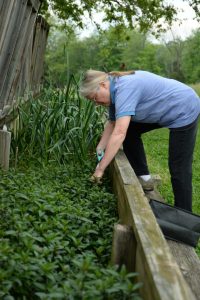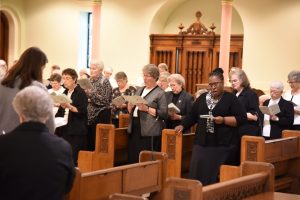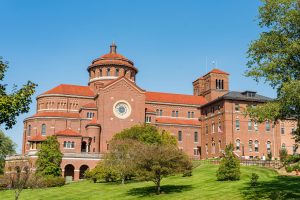In February of 2022, the Sisters of St. Benedict from the Monastery Immaculate Conception in Ferdinand, Indiana had a study day on the encyclical Laudato Si’.

Sister Jean Marie Ballard gathering mint
“We spent the morning looking at the data and realized that ‘things need to change,’ as Pope Francis says,” said Sister Jean Marie Ballard. She is involved in the Justice, Peace and Integrity of Creation working group. “A month after this study day, we committed to the worldwide Catholic community in responding to Pope Francis’ appeal to participate in a seven year journey toward sustainability and integral ecology by developing a Laudato Si’ action plan.”
Implementing the Laudato Si’ Action Plan
Looking at the seven goals set by the Laudato Si’ Action Platform, the community decided on the first steps to implement:
“With regard to ecological economics, we proposed that our investment policies be amended, and the investment committee worked to ensure that the policies embrace the principles of integral ecology.”
Most religious communities hold financial assets whose revenues help the congregation lead its mission and take care of older members.
The Catholic tradition has a long history of making sure investments are aligned with the Church’s teaching. “How we invest our money speaks to what’s important and we know it can influence others,” Sister Ballard shared. “The rule of Saint Benedict taught us to be good stewards, to treat all things as ‘sacred vessels of the altar.’”

The Sisters of St. Benedict in Ferdinand, Indiana gather in prayer.
The Catholic Church’s Established Tradition of Environmental Stewardship
The Sisters, inspired by Vatican documents like Laudato Si’, Journeying Toward Care of Our Common Home and the Laudato Si’ Action Plan, have committed to divesting from fossil fuels. This involves ceasing investments in companies involved in the extraction or distribution of fossil fuels. Sister Ballard remarks:
“We know that changes must be made for future generations to have a livable planet. Divesting from fossil fuels is one way that we can participate to help us reach that goal.”
By publicly divesting, the monastery is sending a strong signal to the economy and to decisions-makers. Fossil fuels are a way of the past and fossil fuel companies are going in the wrong direction. As Pope Francis said in his recent message:
“It is absurd to permit the continued exploration and expansion of fossil fuel infrastructures”.
All investments should be reoriented toward renewable energies and other climate solutions. This isn’t new to the Catholic Church. Pope Francis is building on a long-established magisterial tradition begun with St. Pope John Paul II and Pope Benedict XVI. For example, in Caritas in Veritate, Benedict XVI stated that “every economic decision has a moral consequence” (CV 37) and that “investment always has a moral, as well as economic, significance” (CV 40).
Joining the Movement: Over 350 Catholic Institutions Already Divested
One instance of this is the implementation of solar panels and energy-efficient equipment at various locations within the Diocese of Metuchen in New Jersey, USA, such as schools, parishes, and the Pastoral Center. This initiative is expected to result in cost savings of $3 million over a span of 25 years.

The Sisters of St. Benedict in Ferdinand, Indiana is one of many Catholic institutions who have decided to divest from fossil fuels.
Meanwhile, fossil fuels are harming real communities. A study from the University of Purdue concluded that climate change in Indiana, the home state of the sisters, will bring longer heat waves and extremely hot days that will affect the health of people throughout Indiana.
Over 350 Catholic institutions, dioceses, congregations, universities, health systems, across the world have already decided to publicly commit themselves to divest from fossil fuels. Learn who they are and how you can follow in their footsteps here:
Are there already Catholic institutions that have divested?
Photo credit to the Sisters of St. Benedict in Ferdinand, Indiana.





